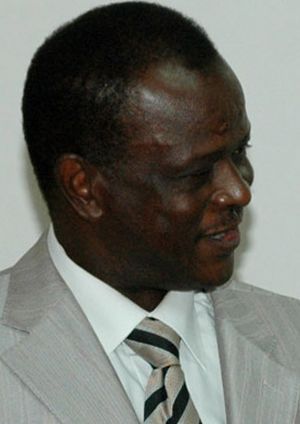Emmanuel Nadingar facts for kids
Quick facts for kids
Emmanuel Nadingar
|
|
|---|---|
 |
|
| 15th Prime Minister of Chad | |
| In office 5 March 2010 – 21 January 2013 |
|
| President | Idriss Déby |
| Preceded by | Youssouf Saleh Abbas |
| Succeeded by | Djimrangar Dadnadji |
| Personal details | |
| Born | 1951 (age 74–75) Bebidja, French Equatorial Africa (now Chad) |
| Political party | Patriotic Salvation Movement |
Emmanuel Djelassem Nadingar, born in 1951, is a politician from Chad. He served as the Prime Minister of Chad from March 2010 to January 2013.
Contents
Emmanuel Nadingar's Journey in Politics
Emmanuel Nadingar was born in 1951 in Bebidja, a town in southwestern Chad. He studied accounting and earned his degree in Brazzaville.
Starting a Political Career
In the mid-1990s, Nadingar started his own political group called the National Party for Recovery and Development. He first joined the government on August 14, 2001. His role was Secretary of State for Economic Promotion and Development. This meant he helped with Chad's economy and growth.
Later, in 2003, he became the Deputy Secretary-General of the Government. After joining the government, his party joined forces with the main ruling party, the Patriotic Salvation Movement (MPS).
Serving as Defense Minister
In 2004, Nadingar became the Acting Minister of Defense. This was a very important job, as he was in charge of Chad's military and security.
One of his main concerns was the violence happening in eastern Chad. This area is close to the border with Sudan. Groups called Janjaweed militia, who were fighting in Sudan's Darfur region, sometimes crossed into Chad. They caused trouble and attacked people.
On May 9, 2004, Nadingar announced that Chadian soldiers had fought with these raiders. He reported that many Janjaweed fighters were stopped. He also shared that some Chadian soldiers and civilians were sadly killed. Nadingar made it clear that Chad was getting very frustrated with these attacks.
Another big challenge for Nadingar as Defense Minister was keeping order within Chad's own army. Some soldiers were unhappy. There was even an incident on May 16, 2004, where some soldiers caused unrest. Nadingar tried to calm the situation. He explained that the soldiers were upset about their pay being stopped. This happened because the government was trying to fix problems with the army's payroll.
On July 23, 2004, Nadingar was officially appointed as the Minister of Defense, Veterans, and War Victims. After this, he held other important roles. He was the Minister of Oil and then a Minister-Delegate for Decentralization from 2008 to 2010.
Becoming Prime Minister
On March 5, 2010, the Prime Minister at the time, Youssouf Saleh Abbas, resigned. President Idriss Déby quickly chose Emmanuel Nadingar to take his place. Nadingar officially became Prime Minister on March 6.
Some people thought Nadingar's appointment was a smart move by the President. Nadingar came from the same area as Ngarlejy Yorongar, a well-known opposition leader. The President might have hoped that Nadingar, as Prime Minister, would gain more support in his home region. This could help him win against Yorongar in future elections.
Nadingar served as Prime Minister for nearly three years. On January 21, 2013, he resigned from his position. Djimrangar Dadnadji was then appointed as the new Prime Minister of Chad.
See also
 In Spanish: Emmanuel Nadingar para niños
In Spanish: Emmanuel Nadingar para niños
 | Selma Burke |
 | Pauline Powell Burns |
 | Frederick J. Brown |
 | Robert Blackburn |

